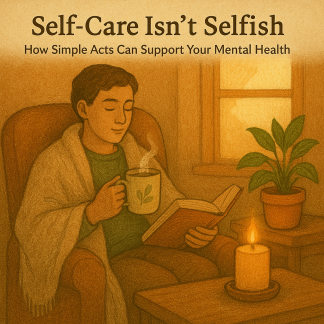Self-Care Isn’t Selfish – How Simple Acts Can Support Your Mental Health
When we hear the phrase “self-care”, many of us think of bubble baths, scented candles, or spa days. While those things can be lovely, self-care goes much deeper—it’s about intentionally doing things that support your emotional and psychological well-being. And the best part? It doesn’t have to be time-consuming or complicated.
As a trauma therapist and bereavement specialist, I often talk with people who feel overwhelmed, burned out, or emotionally stuck. One of the first places we begin is with self-care—not as a luxury, but as a foundation for mental health. In this blog series, I’ll be sharing five gentle, practical strategies that you can build into your daily life, starting with today’s post.
Why Self-Care Matters for Mental Health
Think of self-care as emotional first aid. Just as you’d treat a physical scrape or bruise, your mind and heart need tending to as well. Regular self-care helps regulate your nervous system, build resilience, and create a sense of emotional safety. When we look after ourselves in small, meaningful ways, we’re less likely to spiral into overwhelm, anxiety, or exhaustion.
Strategy #1: The 5-Minute Grounding Pause
What is it?
A quick, mindful check-in with yourself to help regulate emotions, reduce stress, and reconnect with the present moment.
How to do it:
- Find a quiet-ish space—even if it’s just your car or bathroom!
- Sit comfortably, feet on the ground, back supported if possible.
- Take 3 deep breaths, in through the nose and out through the mouth.
- Engage your senses using this quick guide:
- Name 5 things you can see
- Name 4 things you can feel (e.g. clothes, chair, floor)
- Name 3 things you can hear
- Name 2 things you can smell
- Name 1 thing you can taste or something you’re grateful for
Why it works:
This grounding exercise activates the parasympathetic nervous system—our body’s natural “calm down” setting. It draws us away from racing thoughts and into the here and now. This can be especially helpful when emotions feel intense, or when grief, trauma, or anxiety take us out of the present moment.
Therapeutic underpinning:
This approach draws on polyvagal theory, which highlights how safety and connection are key to emotional regulation. Grounding techniques signal to the nervous system that we’re safe enough to rest and reset.
Gentle Reminder
You don’t need to do everything perfectly. Self-care is not another “to-do” list to beat yourself up with. Instead, see it as an invitation: a moment in your day to pause, breathe, and remember that you matter.
This is the first in a five-part series on everyday self-care that supports your mental health. I’ll be sharing more light, doable practices over the coming weeks that anyone can try—no therapy training needed!
Until next time, take five minutes for yourself—you’re worth it.
Kind regards,
Jon x

